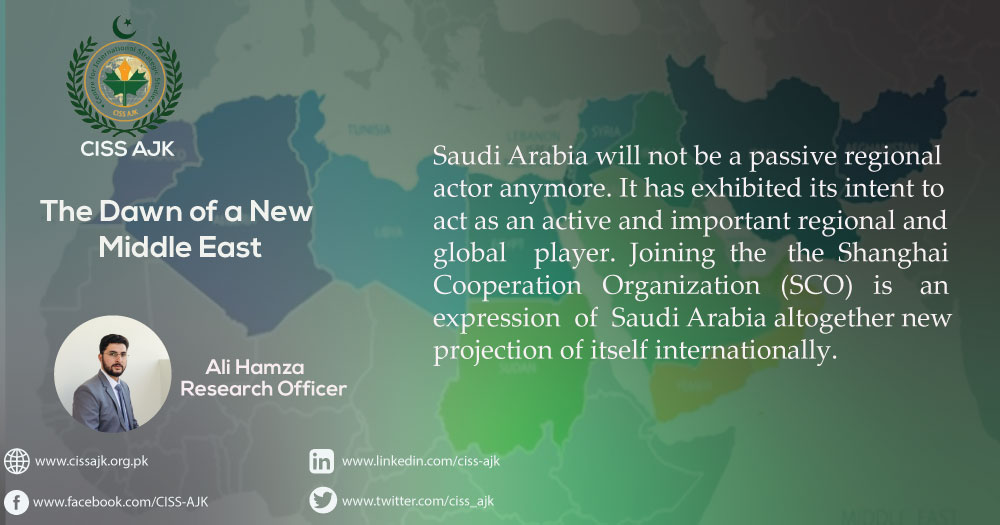613
The Middle East has been the center of global attention recently, as one after one surprising political developments are unveiled in the region. After being sidelined in pursuance of the Obama administration’s “Pivot to Asia” policy, the region has resurfaced as the point of global attention. This began with Saudi Arabia and Iran announcing the reestablishing of their diplomatic relations. This thaw between both Middle Eastern rivals was facilitated by Chinese active diplomacy over the years. At the heels of this development, the news of the Saudi cabinet approving a decision to join the Shanghai Cooperation Organization was reported. This is, undoubtedly, one of the most significant developments internationally. As the pundits of international politics have suggested, Saudi Arabia will not be a passive regional actor anymore. It has exhibited its intent to act as an active and important regional and global player. Joining the Shanghai Cooperation Organization (SCO) is an expression of Saudi Arabia’s altogether new projection of itself internationally.
The Shanghai Cooperation Organization (SCO) is a Eurasian political, economic, and military organization. Formed in 2001 by Russia, China and former Soviet states in Central Asia, the body has been expanded to include India and Pakistan, with a view to playing a bigger role as a counterweight to Western influence in the region. The potential of this organization for countering the Western influence is still a matter of debate, but the size of the economies of the member states, and their international roles, are indicative of the potential the SCO has. Saudi Arabia will initially become a dialogue partner of the SCO, leading to full membership of the kingdom in the mid-term. The approval of the cabinet was followed by an announcement by Saudi Aramco, the Saudi Petrochemical giant, which raised its multi-billion dollar investment in China on Tuesday, by finalising a planned joint venture in northeast China and acquiring a stake in a privately controlled petrochemical group. This is even more significant, as China furthers its energy cooperation with oil-rich Middle Eastern kingdoms. This, too, happens when OPEC+, led by the oil-rich Middle Eastern states, becomes more assertive and has exhibited its will to defy Western commands when required.
Being a member of the SCO Saudi Arabia will be strengthening its economic and political ties with Central Asian countries, China, Russia, and possibly Iran. SCO membership will give Saudi Arabia a better bargaining position with the West. Its membership will be highly significant for Saudi designs of modernizing their economy and projecting Saudi Arabia as an important international actor. The most important consequence of SCO membership for Saudi Arabia can be an opportunity to reduce its dependence on the United States for security cooperation in the region. Saudi Arabia has been skeptical of the United States’ abandonment of the Middle East. As the US departed from the role of main security guarantor in the region with its shifting focus on the Indo-pacific, Middle Eastern states have worked to diversify their partners and become more independent in their foreign policies.
In the larger context of international relations, China, Russia, and Iran have been cultivating a sound relationship to counter American influence. They have been brought closer by their mutual grievances against the over-arching and unjustified American influence. Iran has been the most steadfast Russian partner recently, and the relationship between Russia and China has also been ascending consistently. Saudi Arabia’s increasing engagement with these states is indicative of an emerging international and regional arrangement, which is not necessarily a formal alliance, but a “marriage of convenience.” Saudi Arabia’s decision to join the SCO could potentially strain its relationship with the United States, which has historically been a key ally and security partner for the kingdom. The SCO is widely seen as a counterbalance to US influence in the region, and Saudi Arabia’s decision to join it could be viewed as a shift away from the US. However, it is not clear whether Saudi Arabia will engage with the rivals of the US at the expense of its relationship with the US. It is a test for Saudi Arabia’s diplomats to strike the delicate balance between both centers of power. Nevertheless, it will be a daunting task.
Saudi Arabia’s independent pursuit of its interests internationally with an active diplomatic footprint has provided it with a much better bargaining position. Along with modernizing the Saudi Arabian economy and society, the regime is intent on making the kingdom the dominant voice not only in the Middle East but the world as well. Over the years, Saudi Arabia has built a sound and mutually beneficial relationship with China. It has become more flexible and achieved a breakthrough in its relationship with Iran as well. Its membership in the SCO is the culmination of a new era of Saudi diplomatic independence and assertion and will have influential consequences for the whole Middle East. Saudi Arabia has made it clear that Middle Eastern states will not passively look towards the US as it abandons the region, but they will look for more and better options around.

